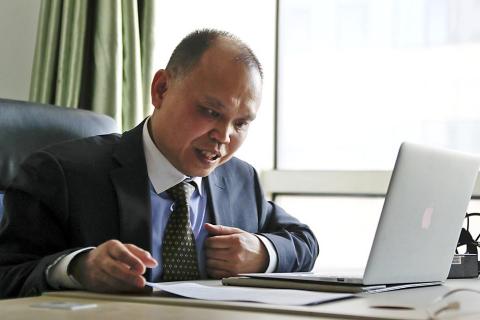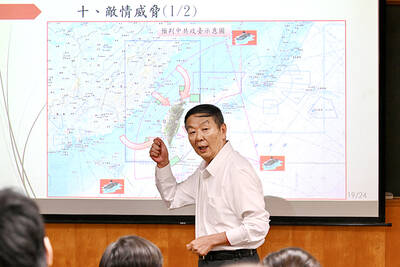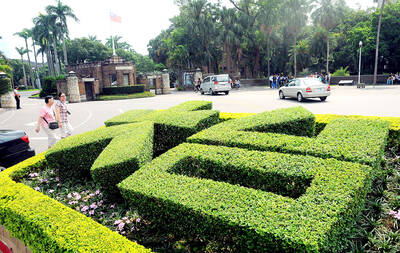The French and German ambassadors to Beijing have granted a human rights award to detained Chinese lawyer Yu Wensheng (余文生), with his wife picking up the prize on his behalf on Monday.
Yu — best known for suing the Beijing city government over the city’s once chronic pollution — was detained in January last year and charged with “inciting subversion of state power.”
Prior to his arrest, Yu had circulated an open letter calling for five reforms to China’s constitution.

Photo: AP
His wife, Xu Yan (許艷), received the award at an event organized by the German embassy in Beijing.
The prominent attorney was among 15 winners of the Franco-German Prize for Human Rights and the Rule of Law, announced in November.
Yu “has lost his freedom for a year and not allowed to meet with a defense lawyer,” Xu said at the event attended by the German and French ambassadors to China, according to a transcript she posted on WeChat.
“His case has been postponed three times and referred back to the police for further investigations twice,” Xu said.
“I learned about this situation when I went to the Xuzhou City Procuratorate on Dec. 24,” she said. “No matter how difficult it is, I will continue to defend the rights of Yu Wensheng, because I believe Yu Wensheng.”
For several days beginning on July 9, 2015, more than 200 Chinese human rights lawyers and advocates were detained or questioned in a police sweep that rights groups called “unprecedented.”
The “709 crackdown,” as it was later dubbed, marked the largest clampdown on the legal profession in recent Chinese history.
However, Yu was not arrested during the sweep and had continued to express his opinions on legal issues.
German Chancellor Angela Merkel in May last year met with Xu and Li Wenzu (李文足) — the wife of another detained rights lawyer, Wang Quanzhang (王全璋) — during her trip to Beijing in a rare move for a visiting leader.

RETHINK? The defense ministry and Navy Command Headquarters could take over the indigenous submarine project and change its production timeline, a source said Admiral Huang Shu-kuang’s (黃曙光) resignation as head of the Indigenous Submarine Program and as a member of the National Security Council could affect the production of submarines, a source said yesterday. Huang in a statement last night said he had decided to resign due to national security concerns while expressing the hope that it would put a stop to political wrangling that only undermines the advancement of the nation’s defense capabilities. Taiwan People’s Party Legislator Vivian Huang (黃珊珊) yesterday said that the admiral, her older brother, felt it was time for him to step down and that he had completed what he

Taiwan has experienced its most significant improvement in the QS World University Rankings by Subject, data provided on Sunday by international higher education analyst Quacquarelli Symonds (QS) showed. Compared with last year’s edition of the rankings, which measure academic excellence and influence, Taiwanese universities made great improvements in the H Index metric, which evaluates research productivity and its impact, with a notable 30 percent increase overall, QS said. Taiwanese universities also made notable progress in the Citations per Paper metric, which measures the impact of research, achieving a 13 percent increase. Taiwanese universities gained 10 percent in Academic Reputation, but declined 18 percent

CHINA REACTS: The patrol and reconnaissance plane ‘transited the Taiwan Strait in international airspace,’ the 7th Fleet said, while Taipei said it saw nothing unusual The US 7th Fleet yesterday said that a US Navy P-8A Poseidon flew through the Taiwan Strait, a day after US and Chinese defense heads held their first talks since November 2022 in an effort to reduce regional tensions. The patrol and reconnaissance plane “transited the Taiwan Strait in international airspace,” the 7th Fleet said in a news release. “By operating within the Taiwan Strait in accordance with international law, the United States upholds the navigational rights and freedoms of all nations.” In a separate statement, the Ministry of National Defense said that it monitored nearby waters and airspace as the aircraft

UNDER DISCUSSION: The combatant command would integrate fast attack boat and anti-ship missile groups to defend waters closest to the coastline, a source said The military could establish a new combatant command as early as 2026, which would be tasked with defending Taiwan’s territorial waters 24 nautical miles (44.4km) from the nation’s coastline, a source familiar with the matter said yesterday. The new command, which would fall under the Naval Command Headquarters, would be led by a vice admiral and integrate existing fast attack boat and anti-ship missile groups, along with the Naval Maritime Surveillance and Reconnaissance Command, said the source, who asked to remain anonymous. It could be launched by 2026, but details are being discussed and no final timetable has been announced, the source